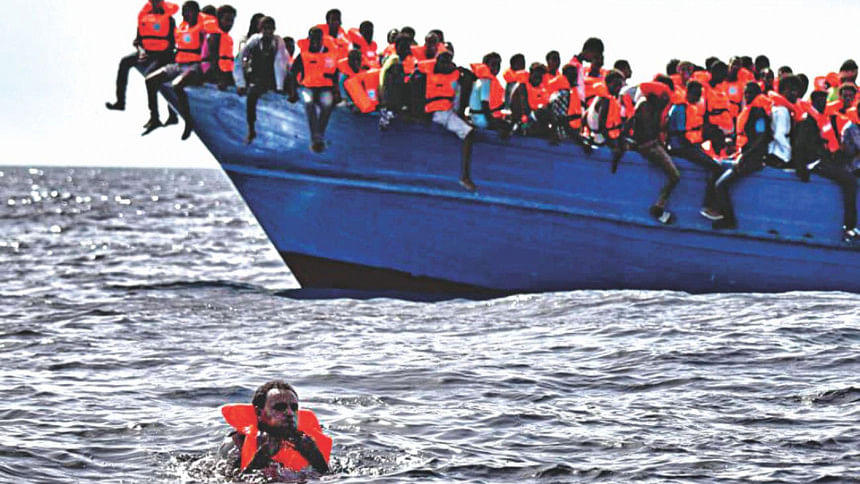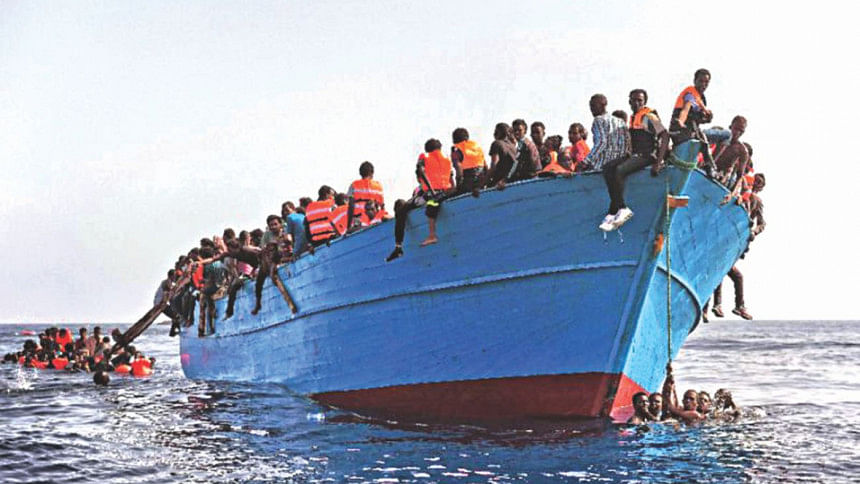Only authoritarians love refugees

Just over a year before his death, Gaddafi was in Italy threatening the EU.
In a breathtakingly racist speech, he warned that Europe could turn "black"and have its culture and civilisation overwhelmed by the "barbarian invasions" of migrants from across the Mediterranean. "We don't know what will be the reaction of the white and Christian Europeans faced with this influx of starving and ignorant Africans..." To stop this terrible fate, Gaddafi wanted the EU to pay Libya to keep down the flow of migrants.
The Europeans thought he was being ridiculous, as well they should. Not because he was being blatantly racist, but because he was asking for USD 5 billion a year.
That was a high price, but the EU certainly seemed to value his services. He had already been cooperating with the EU and various member states — primarily Italy — in various operations to curb migration, and wanted to ratchet it up significantly.
Of course, by the end of 2011 he was dead and his country left in a mess that remains unresolved. Libya remained a transit zone for migrants throughout though, and the EU definitely felt its late friend's absence during the height of the "migrant crisis" in 2015. The Syrian war, plus the existing streams of African migrants, plus all the people who were in Libya and trying to get the hell out of there. The lack of a stable authority in the current Libyan Civil War hasn't stopped the EU and its member states trying to stem the flow, though.
That's how we got to a scenario where the EU mounted "rescue" operations that got more and more people drowned at sea on increasingly precarious boats, in partnership with the Libyan coast guard. Due to the new difficulties and dangers of the sea route, more and more of the people smuggled to Libya ended up stranded there. Guess what happens when a country wracked by civil war gets full of stranded migrants with an established smuggling network suddenly running out of business opportunities? The EU ended up creating a slave economy, but at least they stopped black people reaching Europe, which seems to be considered a win.
The human rights violations by the Libyan coast guard, and abuses in the detention camps by the authorities on migration and the interior, all happen with the knowledge and partnership of the EU, in particular Italy. Far from slowing down cooperation with the Libyan government, the EU and its member states are consistently sending out the same message.
It matters little how repressive your regime is. The EU's main goal is the stemming of migrant flows, and they are willing to partner with practically anyone.
That's why the EU now has a deal with Turkey, where Turkey takes back all irregular migrants going to Greece from Turkey, and generally acts as the EU's border guard. In exchange? Erdoğan gets a host of perks such as easier Schengen visas for Turkish nationals, EU members cooperating to resettle Syrian refugees in Turkey, greater financial assistance for Turkish refugee programmes… and a promise to accelerate Turkey's accession to the EU. All of this is possible by declaring Turkey a safe third country for refugees. These important concessions legitimise Erdoğan's increasingly repressive, illiberal regime — and may have given him the clout to "liberate" parts of Syria.

The nightmare that is Erdoğan hasn't stopped the EU repeating its mistakes across Africa. The EU is increasingly involved with authoritarian regimes that act either as origin countries for migrants, or transit zones. The level of unsavoury vary from Morocco's almost urbane repressiveness to Egypt's strategic powerplays to Sudan and Eritrea. Eritrea is a paranoid fascist nightmare dressed in a flag — it has indefinite conscription, and snipers at the border whose job is to shoot people trying to leave. Sudan is an internationally condemned rogue state — but if Libya can be partnered with…
The EU's aid in development and security cooperation gives increased clout to each of these countries to pursue their individual, suspect agendas. Morocco, for example, hopes to use the EU's migration paranoia as leverage to gain international legitimacy in its seizure of the Western Sahara. Sudan, meanwhile, has the simple — supposedly unthinkable — goal of moving away from its pariah status. This is a country on the US terror list. Whether we agree that Sudan deserves to be ostracised or not, the EU appears willing to normalise relations with the country just to reduce migration.
Not only is this a ridiculous betrayal of the EU's self-image as the liberal heart of the world (now that the USA is out of that game), it's also dumb. The EU is trading short term reductions in refugee flows for support to repressive regimes — furthering the possibility of deteriorating social conditions in its partner states, the sort of conditions people try to flee from. Some refugees now, or more refugees later?
It's no secret that authoritarian leaders in the West have been using the fear of refugees to bolster their base and create increasingly repressive states. This same fear of the black and the brown body gives authoritarian leaders in transit and origin countries power as well — pay us, help us, and we'll stop these people reaching your shores. The EU is so paranoid of disintegrating and losing to the populists within its own borders, they are willing to cut devil deals with those outside.
It's easy to forget that a refugee is someone, fundamentally, in search of a safe haven. The politics of refugees should be how best to provide them with the aid they need. We have learned many depressing truths about politics this decade, but here is possibly the barest and most disgusting lesson — the disposed don't matter, except as bargaining chips, except as tools.
It seems that only authoritarians want refugees around. They come in so handy.
With thanks to Niki Papadogiannakis and Marie Gemarius De Kepper for their advice on this article.
The writer is an artist and an MA candidate in International Migration at the University of Kent. Read more of this sort of thing in Disconnect: Collected Short Fiction.

 For all latest news, follow The Daily Star's Google News channel.
For all latest news, follow The Daily Star's Google News channel. 



Comments